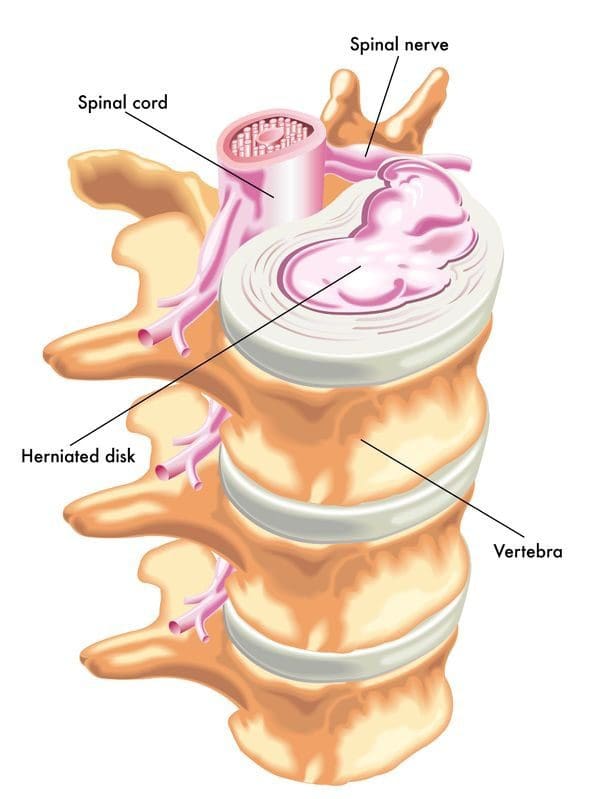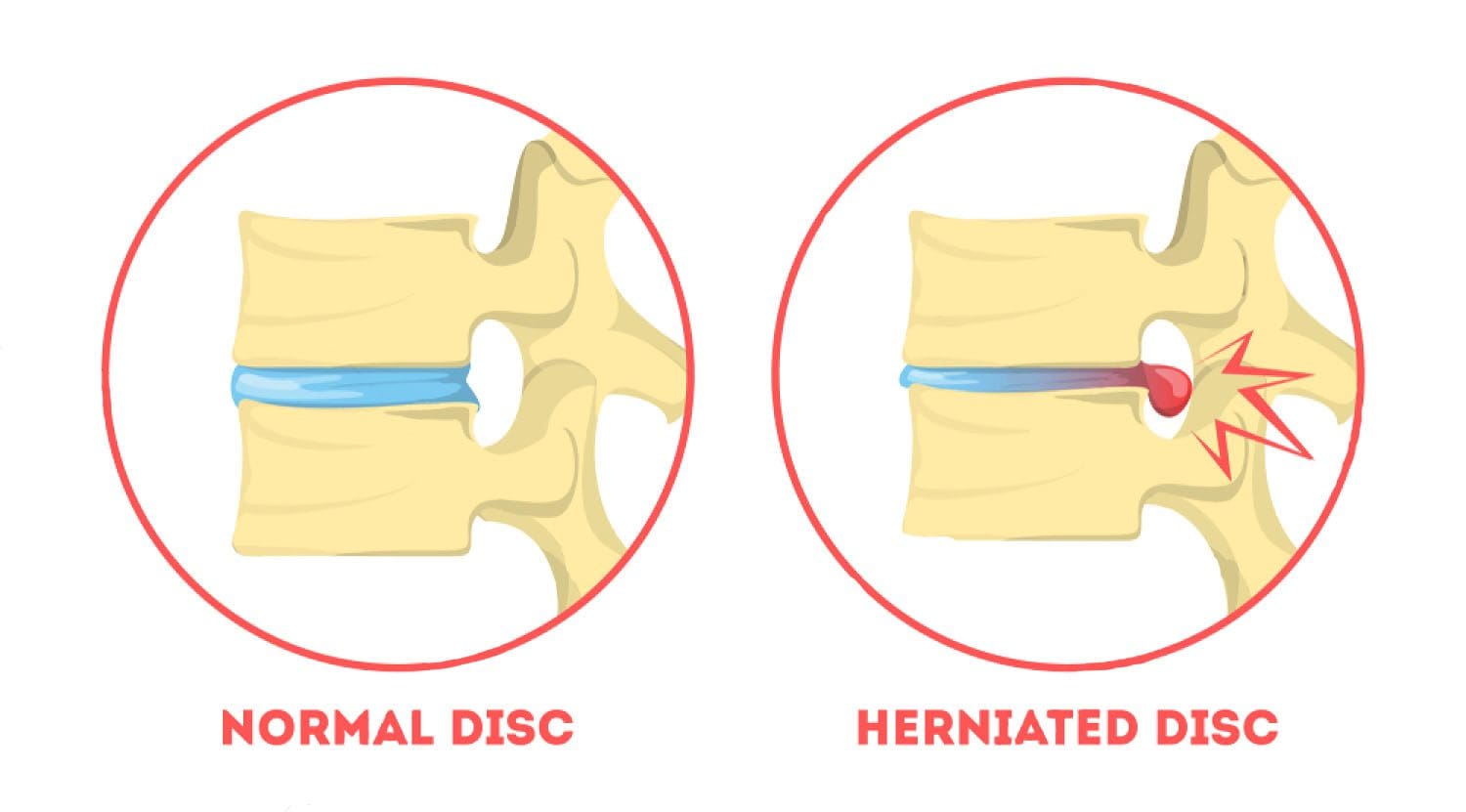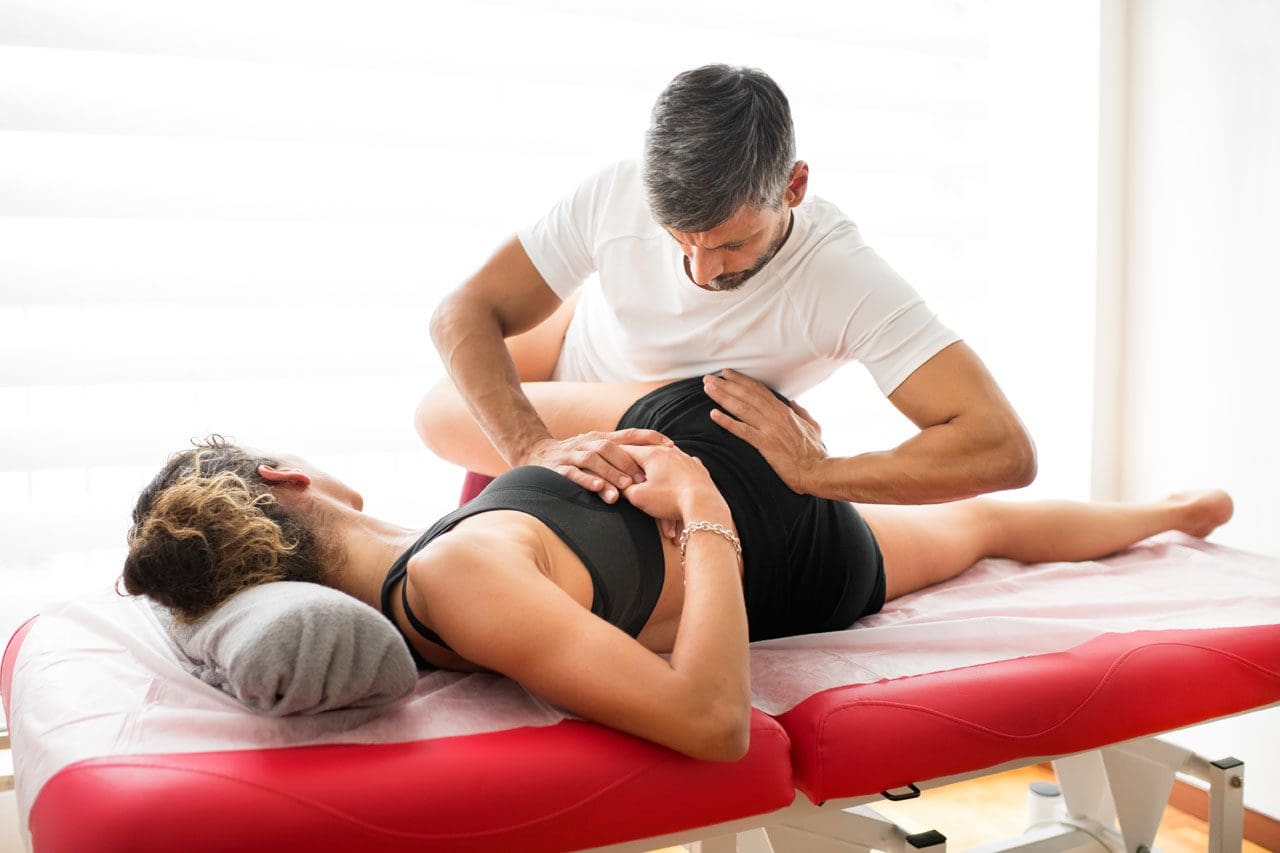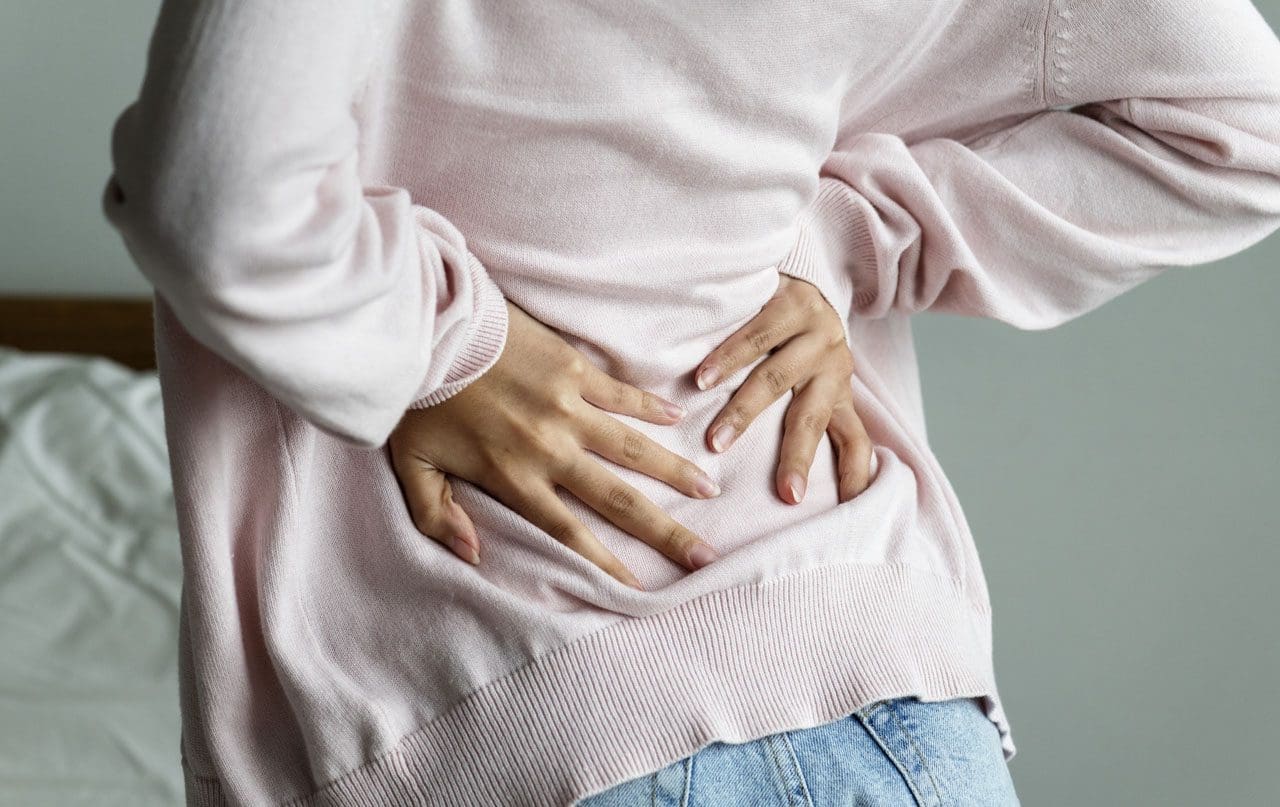Herniation can be caused by a combination of factors or physical injury. Individuals can develop a herniated, slipped, or bulging disc in the neck or back. Too much stress on the disc/s, whether from poor posture, being overweight, injury, aging, and an unhealthy lifestyle, can increase the risk for disc problems. Several common questions about disc problems are answered.
Table of Contents
Can Discs Slip
A slipped disc can mean a ruptured or herniated disc. We use the term slipped disc; however, the discs do not slip. Each disc is sandwiched between two vertebrae, supported by a system of ligaments that hold the spine together. A bulging or herniated disc is the proper term.

Difference Between a Bulging and Herniated Disc
Disc disorders are categorized as contained or non-contained. A bulging disc is an example of a contained disc disorder.
Bulging
A bulging disc has not broken open, meaning the nucleus is still contained inside the annulus fibrosus. The disc could protrude into the spinal canal without breaking open. The gel and the jelly interior do not leak out. The disc stays intact, except a small bubble pops out.

Herniated/Ruptured
A non-contained disc has either partially or entirely broken open, which is a herniated/ruptured disc. Imagine a closed tube being squeezed and placed under pressure, which causes the contents to move wherever they can. If a portion of the tube is weak or under too much pressure, the contents could leak or burst out. The gel-like contents could spread to the spinal cord and nerves when a disc herniates.
Herniation Can Cause Pain
The disc’s gel-like nucleus has a chemical that irritates the nerves and causes them to become inflamed and swell. The chemical stays and continues to press on the irritated nerves. Sometimes fragments from the disc wall or the tube break off from the disc and drift into the spinal canal, causing other nerves to inflame and swell. Sometimes injury causes a combination of disc disorders. Based on the discs’ type of injury and condition, more than one disc could herniate, rupture, or bulge.
Symptoms
Symptoms of a herniated disc can include:
- Dull
- Shooting pain
- Muscle spasms
- Cramping
- Weakness
- Tingling
- Referred or radiating/traveling pain
Sometimes, however, a herniated disc does not cause any symptoms. When this happens, it is called an asymptomatic herniated disc. Disc/s could be bulging or herniated, but if they are not applying pressure on the spinal nerve/s or the cord, symptoms like pain may not be present. This makes a point about herniated disc symptoms that they are dependent on where you have a herniated disc.

Cervical Herniation Symptoms
With a herniated or bulging disc in the neck, then you could experience:
- Neck soreness/pain
- Muscle tightness
- Cramping in the neck
- Pain that travels down the arm/s
- Tingling in the arm/s or hand/s
- Weakness in the arm/s or hand/s
Lumbar Herniation Symptoms
With a herniated disc in the low back, the following symptoms could happen:
- Low back pain
- Muscle tightness
- Cramping in and around the low back
- Radiating pain that travels down the leg/s
- Tingling in your leg/s or foot/feet
- Weakness in the leg/s or foot/feet
Referred Pain
Referred pain means that you have pain in another part of the body from the disc problem. An individual could have a bulging or herniated slipped disc in the low back and have pain in the leg. This is lumbar radiculopathy or sciatica. Usually, just one leg is affected. If you have a herniated disc in the neck, there could be referred pain going down the arm and into the hand.

Chiropractic Cares
A chiropractor can help relieve back pain and other herniated disc symptoms. A chiropractor will go through your medical history, do a physical exam, and perform orthopedic and neurological tests. They are looking at several things. Orthopedic and neurological exams can help the chiropractor figure out what’s going on.
- Are reflexes functioning correctly? Meaning are the nerves are sending messages correctly. An example is a reflex test is when a doctor taps the knee with a hammer and the leg kicks.
- Is there a loss of muscle strength?
- Signs of muscle/s wasting away?
- Is there a loss of sensation, tingling, or numbness along the nerve/s path?
They will carefully look at posture and probably order an X-ray or MRI to help with the diagnosis.
Chiropractors evaluate the entire spine. Even if you only have lower back pain, your chiropractor will examine your neck, too. They want to see how well your spine is functioning overall. Remember what happens to one area of your spine can influence another part of the spine and/or body.
Pain from a herniated disc can make it difficult to enjoy daily life. Walking, sitting, and sleeping normally/comfortably can become a nightmare. You should make an appointment with a doctor or chiropractor if your herniated slipped disc symptoms last for more than two weeks.
Herniated Disc Treatment
Post Disclaimer
Professional Scope of Practice *
The information on this blog site is not intended to replace a one-on-one relationship with a qualified healthcare professional or licensed physician and is not medical advice. We encourage you to make healthcare decisions based on your research and partnership with a qualified healthcare professional.
Blog Information & Scope Discussions
Welcome to El Paso's Premier Wellness and Injury Care Clinic & Wellness Blog, where Dr. Alex Jimenez, DC, FNP-C, a board-certified Family Practice Nurse Practitioner (FNP-BC) and Chiropractor (DC), presents insights on how our team is dedicated to holistic healing and personalized care. Our practice aligns with evidence-based treatment protocols inspired by integrative medicine principles, similar to those found on this site and our family practice-based chiromed.com site, focusing on restoring health naturally for patients of all ages.
Our areas of chiropractic practice include Wellness & Nutrition, Chronic Pain, Personal Injury, Auto Accident Care, Work Injuries, Back Injury, Low Back Pain, Neck Pain, Migraine Headaches, Sports Injuries, Severe Sciatica, Scoliosis, Complex Herniated Discs, Fibromyalgia, Chronic Pain, Complex Injuries, Stress Management, Functional Medicine Treatments, and in-scope care protocols.
Our information scope is limited to chiropractic, musculoskeletal, physical medicine, wellness, contributing etiological viscerosomatic disturbances within clinical presentations, associated somato-visceral reflex clinical dynamics, subluxation complexes, sensitive health issues, and functional medicine articles, topics, and discussions.
We provide and present clinical collaboration with specialists from various disciplines. Each specialist is governed by their professional scope of practice and their jurisdiction of licensure. We use functional health & wellness protocols to treat and support care for the injuries or disorders of the musculoskeletal system.
Our videos, posts, topics, subjects, and insights cover clinical matters and issues that relate to and directly or indirectly support our clinical scope of practice.*
Our office has made a reasonable effort to provide supportive citations and has identified relevant research studies that support our posts. We provide copies of supporting research studies available to regulatory boards and the public upon request.
We understand that we cover matters that require an additional explanation of how they may assist in a particular care plan or treatment protocol; therefore, to discuss the subject matter above further, please feel free to ask Dr. Alex Jimenez, DC, APRN, FNP-BC, or contact us at 915-850-0900.
We are here to help you and your family.
Blessings
Dr. Alex Jimenez DC, MSACP, APRN, FNP-BC*, CCST, IFMCP, CFMP, ATN
email: coach@elpasofunctionalmedicine.com
Licensed as a Doctor of Chiropractic (DC) in Texas & New Mexico*
Texas DC License # TX5807
New Mexico DC License # NM-DC2182
Licensed as a Registered Nurse (RN*) in Texas & Multistate
Texas RN License # 1191402
ANCC FNP-BC: Board Certified Nurse Practitioner*
Compact Status: Multi-State License: Authorized to Practice in 40 States*
Graduate with Honors: ICHS: MSN-FNP (Family Nurse Practitioner Program)
Degree Granted. Master's in Family Practice MSN Diploma (Cum Laude)
Dr. Alex Jimenez, DC, APRN, FNP-BC*, CFMP, IFMCP, ATN, CCST
My Digital Business Card


